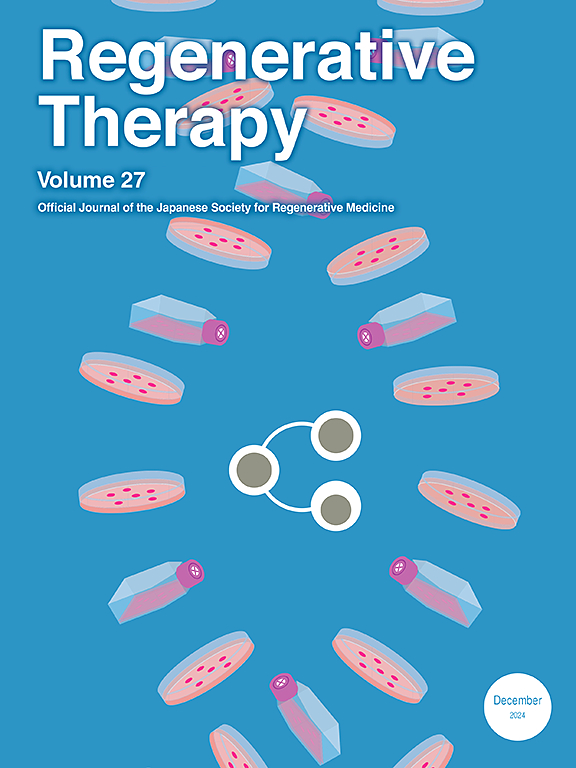Transplantation of adipose-derived stem cell aggregates via hydrogel microspheres that incorporate growth factors increases muscle strength
IF 3.5
3区 环境科学与生态学
Q3 CELL & TISSUE ENGINEERING
引用次数: 0
Abstract
Introduction
Stem cell transplantation is widely employed to treat various diseases, and adipose-derived mesenchymal stem cells (ASCs) are used for allogeneic xenotransplantation. However, muscle function post stem cell transplantation remains largely understudied. Therefore, we aimed to investigate the optimal conditions for the transplantation of ASC aggregates of gelatin hydrogel microparticles incorporating growth factors. We further aimed to establish a method for improving muscle function via ASC implantation combined with muscle loading through treadmill running.
Methods
Mouse ASCs suspended in various solutions were transplanted into the soleus muscles. The strength of each mouse was measured using a digital force gauge after a muscle load was applied using a treadmill.
Results
Platelet-rich growth factor-BB (PDGF-BB) effectively facilitated the expression of MYO-D in the ASCs. Moreover, the injection of cell aggregates rather than suspensions enhanced cell retention. Transplantation of ASC-aggregate gelatin hydrogel microparticles incorporating PDGF-BB in combination with muscle load using a treadmill enhanced mouse muscle function.
Conclusions
ASC aggregates with growth factor transplantation likely enhance cell retention. Moreover, they likely improve muscle function and load. Thus, our findings provide new avenues for cell regeneration therapy in muscle rehabilitation.
通过含有生长因子的水凝胶微球移植脂肪来源的干细胞聚集体可增加肌肉力量
干细胞移植被广泛用于治疗各种疾病,脂肪源性间充质干细胞(ASCs)被用于异体异种移植。然而,干细胞移植后的肌肉功能仍未得到充分研究。因此,我们的目的是研究含有生长因子的明胶水凝胶微颗粒的ASC聚集体移植的最佳条件。我们进一步的目的是建立一种通过ASC植入结合跑步机肌肉负荷来改善肌肉功能的方法。方法将悬浮在不同溶液中的小鼠ASCs移植到比目鱼肌中。在跑步机上施加肌肉负荷后,使用数字力计测量每只小鼠的力量。结果富血小板生长因子bb (PDGF-BB)能有效促进MYO-D在ASCs中的表达。此外,注射细胞聚集体而不是悬浮液增强了细胞潴留。在跑步机上移植含有PDGF-BB的asc聚集体明胶水凝胶微粒,结合肌肉负荷,增强小鼠肌肉功能。结论sasc聚集体与生长因子移植可能增强细胞潴留。此外,它们可能会改善肌肉功能和负荷。因此,我们的发现为肌肉康复中的细胞再生治疗提供了新的途径。
本文章由计算机程序翻译,如有差异,请以英文原文为准。
求助全文
约1分钟内获得全文
求助全文
来源期刊

Regenerative Therapy
Engineering-Biomedical Engineering
CiteScore
6.00
自引率
2.30%
发文量
106
审稿时长
49 days
期刊介绍:
Regenerative Therapy is the official peer-reviewed online journal of the Japanese Society for Regenerative Medicine.
Regenerative Therapy is a multidisciplinary journal that publishes original articles and reviews of basic research, clinical translation, industrial development, and regulatory issues focusing on stem cell biology, tissue engineering, and regenerative medicine.
 求助内容:
求助内容: 应助结果提醒方式:
应助结果提醒方式:


